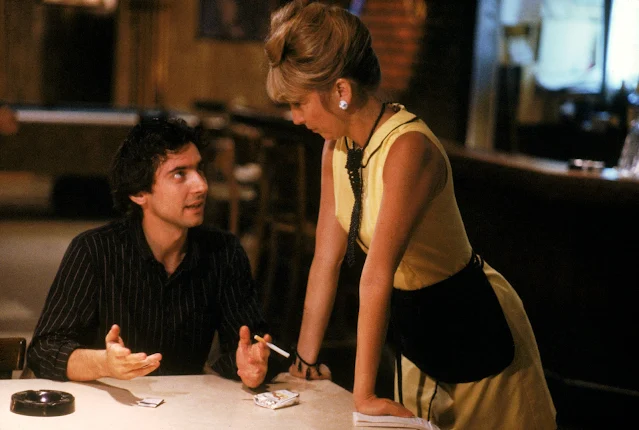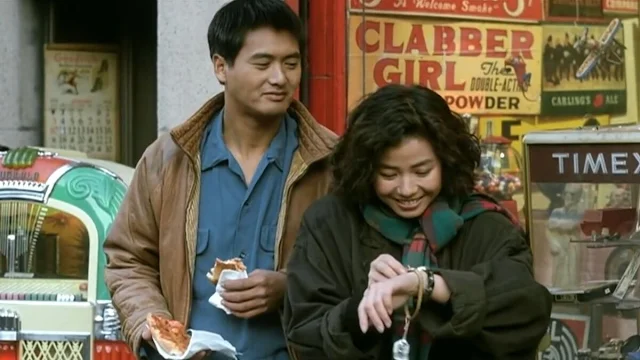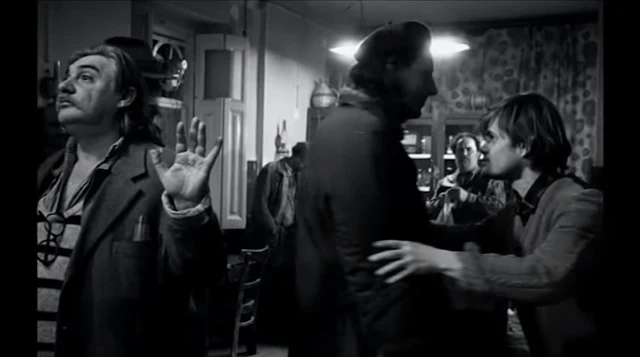
A blog formerly known as Bookishness / By Charles Matthews
"Dazzled by so many and such marvelous inventions, the people of Macondo ... became indignant over the living images that the prosperous merchant Bruno Crespi projected in the theater with the lion-head ticket windows, for a character who had died and was buried in one film and for whose misfortune tears had been shed would reappear alive and transformed into an Arab in the next one. The audience, who had paid two cents apiece to share the difficulties of the actors, would not tolerate that outlandish fraud and they broke up the seats. The mayor, at the urging of Bruno Crespi, explained in a proclamation that the cinema was a machine of illusions that did not merit the emotional outbursts of the audience. With that discouraging explanation many ... decided not to return to the movies, considering that they already had too many troubles of their own to weep over the acted-out misfortunes of imaginary beings."--Gabriel García Márquez, One Hundred Years of Solitude
Search This Blog
Tuesday, April 30, 2024
Werckmeister Harmonies (Béla Tarr, Ágnes Hranitzky, 2000)

One Way Street (Hugo Fregonese, 1950)
 |
| James Mason, Dan Duryea, and William Conrad in One Way Street |
Saturday, April 27, 2024
Full Moon in New York (Stanley Kwan, 1989)
 |
| Gaowa Siqin and Sylvia Chang in Full Moon in New York |
Cast: Sylvia Chang, Maggie Cheung, Gaowa Siqin. Screenplay: Chiu Kang-Chen, Zhong Acheng. Cinematography: Bill Wong. Production design: Lei Pan. Film editing: Chow Cheung-Kan. Music: Chang Hung-Yi.
Full Moon in New York is based on a concept: Show something about the Chinese diaspora through the lives of three young women in New York. And as far as the concept goes, it works. Stanley Kwan gives us three points of origin and three distinct societal roles: Lee Fung Jiao (Maggie Cheung) is a type-A businesswoman from Hong Kong who is having an affair with another woman; Wang Hsiung-Ping (Sylvia Chang) is an unmarried aspiring actress from Taiwan; and Zhaohong (Gaowa Siqin) is a newlywed homemaker from the Mainland. Despite their disparate backgrounds, they meet and become friends largely because they're all Chinese trying to make their way in an alien land and culture. The film is full of lively scenes in which each meets her own particular challenge and finds a way through it, and equally lively scenes in which their friendship blossoms over the way they met these challenges. The three actresses are marvelous, but the supporting cast isn't always up to their standard. I speak no Chinese, so I can't judge the delivery of the Chinese actors, but I found the Americans in the cast sometimes inept and amateurish. There's also something off in the scene in which Wang auditions in English for the role of Lady Macbeth: She seems to be speaking a paraphrase of the sleepwalking scene instead of the actual lines from Shakespeare's play. The scene is really a setup for her to give the American casting director, who wants to know why she thinks a Chinese actress could play the role, a lesson in Chinese history. Still, Full Moon in New York is good enough to leave me wanting more of the stories of these women. It feels very much like the pilot for a TV series that never got made.
Friday, April 26, 2024
Your Name. (Makoto Shinkai, 2016)
Makoto Shinkai's most commercially successful and most critically acclaimed anime is an engaging variation on the body-switch trope usually used for comedy or satire. Here it's the basis for a romantic fantasy about growing up, with its attendant problems of love and loss. A boy in Tokyo wakes up one morning to find that he's inhabiting the body of a girl in a village, and she wakes up with his consciousness inside her body. The usual comic mishaps occur as each goes through the other's daily routine. They wake up the next day with no memory of the switch, but the reactions of their family and friends make them realize that something strange happened. When it happens again and again, they begin to figure out what's going on and to keep a record of it. Eventually each discovers the other's identity and tries to communicate with them, but then the switches suddenly stop. It falls to the boy to recognize that the cessation of the switches has something to do with a disaster that struck the girl's village three years earlier. His determination to get to the source of the mystery forms the main plot of the film. Your Name is overloaded with perhaps more cosmic and mystical stuff than some viewers can tolerate, and it sidesteps some real issues about gender identity, but the astonishing visuals, cliff-hanging action and suspense, and heartfelt emotion help keep the film from bogging down into sheer hooey.
Thursday, April 25, 2024
The File on Thelma Jordon (Robert Siodmak, 1950)
 |
| Wendell Corey and Barbara Stanwyck in The File on Thelma Jordon |
Cast: Barbara Stanwyck, Wendell Corey, Paul Kelly, Joan Tetzel, Stanley Willis, Richard Rober, Minor Watson, Barry Kelley, Gertrude Hoffman. Screenplay: Ketti Frings, Marty Holland. Cinematography: George Barnes. Art direction: Hans Dreier, A. Earl Hedrick. Film editing: Warren Low. Music: Victor Young.
The chief problem with The File on Thelma Jordon is casting. Barbara Stanwyck's performance is terrific, of course, Robert Siodmak keeps a complex plot from snarling, and George Barnes's lights and shadows are eloquent. But Stanwyck is paired once again with Wendell Corey, who was her ineffective leading man in Anthony Mann's otherwise splendid The Furies, also made in 1950. Corey has no charisma and no depth. The screenplay may be at fault in not letting us see why Cleve Marshall's antagonism to his father-in-law is driving him to drink -- and into the arms of Stanwyck's scheming Thelma Jordon -- but Corey's hangdog manner doesn't help. Nor does he bring much visible intelligence to Marshall's scheming to undermine his own defense of Thelma when she's brought to trial for killing her aunt -- a murder he helped her cover up. The ending is also a bit of a muddle, largely because the Production Code meant that Thelma's crime had to be punished. What could have been a classic film noir ends up only a passable one.
Wednesday, April 24, 2024
After Hours (Martin Scorsese, 1985)
 |
| Griffin Dunne and Teri Garr in After Hours |
Cast: Griffin Dunne, Rosanna Arquette, Verna Bloom, Tommy Chong, Linda Fiorentino, Teri Garr, John Heard, Cheech Marin, Catherine O'Hara, Dick Miller, Will Patton, Robert Plunket, Bronson Pinchot. Screenplay: Joseph Minion. Cinematography: Michael Ballhaus. Production design: Jeffrey Townsend. Film editing: Thelma Schoonmaker. Music: Howard Shore.
Martin Scorsese's dark farce After Hours puts protagonist Paul Hackett (Griffin Dunne) through all the wringers that 1980s New York City could provide. It's often described as "Kafkaesque" with reason: Scorsese borrowed from a Kafka story in the scene in which Paul tries to persuade a doorman to let him into a night club. But it also reflects the director's feelings about being given the runaround by the bureaucracy of the movie business as he tried to get The Last Temptation of Christ (1988) under way. There are those who think After Hours has a misogynistic edge, given that most of Paul's troubles stem from his interactions with women, starting with Marcy (Rosanna Arquette), who flirts with him and sets the whole fantastic plot in motion. But Paul's frantic inability to seize control of events -- some of which, like the loss of his money, are pure accident -- is also to blame. He's an Odysseus blown off course by fate, with the occasional Circe or siren to make things worse.
Tuesday, April 23, 2024
An Autumn's Tale (Mabel Cheung, 1987)
 |
| Chow Yun-fat and Cherie Chung in An Autumn's Tale |
Cast: Chow Yun-fat, Cherie Chung, Danny Chan, Arthur Fulbright, Gigi Wong, Joyce Houseknecht. Screenplay: Alex Law, Low Chi-Yeuh. Cinematography: David Chung, James Hayman. Production design: Christy Addis. Film editing: Chu Sun-Kit. Music: Lowell Lo.
The chemistry between Chow Yun-fat and Cherie Chung animates the somewhat rough-edged romance of Samuel Pang (Chow) , a thirtysomething slacker, and Jennifer Lee (Chung), a twentysomething woman who arrives in New York expecting to meet her boyfriend, Vincent (Danny Chan), only to find he has a new girlfriend and is moving to Boston. Samuel, known as Figgy (short for Figurehead, a reference to his years as a sailor), takes her under his wing, though she's put off by his slacker ways -- he survives mainly by gambling and carousing with his pals. As in any good romance, she loosens up and he straightens up, though not without the usual backsliding. The film gives some fresh twists to the usual romcom tropes.
Monday, April 22, 2024
Children Who Chase Lost Voices (Makoto Shinkai, 2011)

Cast: Voices of Hisako Kanemoto, Miyu Irino, Kazuhiko Inoue, Junko Takeuchi, Fumiko Orikasa, Sumi Shimamoto. Screenplay: Makoto Shinkai. Cinematography: Makoto Shinkai. Art direction: Takumi Tanji. Film editing: Aya Hida, Makoto Shinkai. Music: Tenmon.
Myth-making anime fantasy, crafted with Makoto Shinkai's usual opulence, Children Who Chase Lost Voices draws on a variety of legends about the underworld, including Orpheus's journey to Hades to reclaim Eurydice. The protagonist is a young girl, Asuna, who finds herself in a subterranean land called Agartha, accompanied by her teacher, Mr. Morisaki, who knows a good deal, though not enough, about Agartha. He wants to go there to see if he can bring his dead wife back to life. Asuna is driven by curiosity about a strange boy named Shun, whom she met on her wanderings in the hills near her village. They discover that they have to deal with the animosity of the residents of Agartha toward people from the upper world. (The subtitles call them "Topsiders," which for me has a distracting footwear overtone.) It's too creepy and violent for younger kids, and some of its plot points, such as the suggestion that Agartha has been exploited by malign upper-world forces like the Nazis, need better context. But it's never boring and always a treat for the eye.
Sunday, April 21, 2024
Deal of the Century (William Friedkin, 1983)
 |
| Chevy Chase in Deal of the Century |
Cast: Chevy Chase, Sigourney Weaver, Gregory Hines, Vince Edwards, Wallace Shawn, Richard Libertini, William Marquez, Eduardo Ricard, Richard Herd, Graham Jarvis. Screenplay: Paul Brickman. Cinematography: Richard H. Kline. Production design: Bill Malley. Film editing: Jere Huggins, Ned Humphreys, Bud S. Smith. Music: Arthur B. Rubinstein.
Chevy Chase, Sigourney Weaver, and Gregory Hines stumble through the chaotic screenplay of Deal of the Century, not trying very hard to help it tell a coherent story or even be funny. Ostensibly a satire of the Reagan-era arms race, it was a critical bomb and a box office dud, and unlike many such double failures hasn't even made it to cult-movie status. Too much of it fails to make sense, like the marriage of the characters played by Weaver and Wallace Shawn, the religious conversion of Hines's character, or Chase's character getting repeatedly shot in the foot. Cheesy special effects don't help, either.
Saturday, April 20, 2024
Try and Get Me! (aka The Sound of Fury) (Cy Endfield, 1950)
 |
| Lloyd Bridges and Frank Lovejoy in Try and Get Me! |
Cast: Frank Lovejoy, Kathleen Ryan, Lloyd Bridges, Richard Carlson, Katherine Locke, Adele Jergens, Art Smith, Renzo Cesano, Irene Vernon, Cliff Clark, Harry Shannon, Donald Doss, Joe E. Ross. Screenplay: Jo Pagano, based on his novel. Cinematography: Guy Roe. Production design: Perry Ferguson. Film editing: George Amy. Music: Hugo Friedhofer.
Climaxing in a vividly filmed and edited scene of a mob storming a city jail, Try and Get Me! is the second film based on a lynching that took place in San Jose in 1933. The first, Fritz Lang's Fury (1936), starring Spencer Tracy and Sylvia Sidney, is better-known and better acted, but Cy Enfield's version of the story, scripted by Jo Pagano from his fictionalized account of the incident, is equally gripping. What it lacks in its cast, it makes up for in sheer momentum. Frank Lovejoy plays Howard Tyler, an out-of-work man with a wife and child, whose desperation at providing for his family causes him to fall for the blandishments of Jerry Slocum, a sleazy thief played (not to say overplayed) by Lloyd Bridges. When Jerry murders a rich man's son during a kidnapping plot, Howard is trapped in a situation beyond his control. Public opinion is stirred up by newspaper columnist Gil Stanton (the bland and miscast Richard Carlson), who succumbs to his editor's sensationalism. The movie is mostly uncompromising in its hard-nosed treatment of the story, with only a few lapses into sentimentality in its portrayal of Howard's wife and son. Under the original title, The Sound of Fury (a probably intentional echo of Lang's film as well as William Faulkner's The Sound and the Fury), it was a box office failure, leading producer Robert Stillman to re-release it under the title Try and Get Me! But it failed to find an audience until it was restored by the Film Noir Foundation in 2020.
Friday, April 19, 2024
Nocturama (Bertrand Bonello, 2016)
Nocturama is a kind of existential thriller in which a group of young people bomb and burn various Parisian landmarks. I use the word "existential" because their terrorism appears to be unmotivated; it's an acte gratuit that seems to stem from no political or social dissatisfaction. The narrative is elliptical: We watch the members of the group as they cross Paris to assemble at their various assigned targets before we even know where they're going and why. Eventually, there's a flashback that shows their preparatory meeting, but even that supplies only the most rudimentary information: that the explosive is semtex, which has been procured for them an older man named Greg (Vincent Rottiers). Their several missions accomplished, they regroup in a department store that's closed for the night, where they raid the food and wine department, try on the clothes, listen to music, and watch the news, which eventually reveals that their hideout has been discovered. Two of them are missing: One is killed in a showdown with a security guard, while Greg suffers a fate that we learn about in a curious way. The outcome is presented with a cold-blooded detachment. Bertrand Bonello breaks no new ground for the thriller genre, but skillfully plays with the viewer's reactions to the young protagonists, an alternation of censure and sympathy.
Thursday, April 18, 2024
Assault on Precinct 13 (John Carpenter, 1976)
 |
| Austin Stoker, Laurie Zimmer, and Darwin Joston in Assault on Precinct 13 |
Cast: Austin Stoker, Darwin Joston, Laurie Zimmer, Martin West, Tony Burton, Charles Cyphers, Nancy Kyes, Peter Bruni, John J. Fox, Marc Ross, Alan Koss, Henry Brandon, Kim Richards. Screenplay: John Carpenter. Cinematography: Douglas Knapp. Art direction: Tommy Lee Wallace. Film editing: John Carpenter. Music: John Carpenter.
Jean-François Richet's 2005 remake of Assault on Precinct 13 makes a lot more narrative sense and has a much better cast (Ethan Hawke, Laurence Fishburne, etc.), but it feels routine in comparison with the laconic, low budget original, which John Carpenter admitted was a kind of mashup of Howard Hawks's Rio Bravo (1959) and George Romero's Night of the Living Dead (1968). Which only goes to show that when it comes to thrillers, coherence and slick production values are not the top priorities. Setting the hook is what matters, and Carpenter's movie does that early with a shocker of a scene that almost earned the film an X rating -- one of the rare instances when the ratings board was upset by violence rather than sex. In this case, the film's rough edges and unknown actors somehow add a neo-realist touch to a movie in which the bad guys might as well be zombies or space aliens for all we get to know about them.
Wednesday, April 17, 2024
Farewell China (Clara Law, 1990)
 |
| Maggie Cheung and Tony Leung Ka-fai in Farewell China |
Cast: Maggie Cheung, Tony Leung Ka-fai, Hayley Man, Lester Chit-Man Chan, Hung Chun, Jun Liao. Screenplay: Eddie Ling-Ching Fong. Cinematography: Jingle Ma. Art direction: Lee Lok-Si. Film editing: Ma Kam. Music: Jim Shum.
Despite a narrative clotted with flashbacks, some scenes that don't seem to fit, and an unsteadiness of tone, Clara Law's Farewell China remains a vivid, sometimes harrowing look at Chinese immigrants in New York City. Maggie Cheung gives a dazzling performance as Li Hung, who leaves her husband, Zhao Nansan (Tony Leung Ka-fai) and their infant son in China to seek work in New York. When Nansan stops hearing from Hung, he finds his way to the city to search for her. Hayley Man gives a lively performance as a 15-year-old Chinese-American runaway from her family in Detroit, who steals and turns tricks as she aids Nansan in his search through the city's lower depths.
Tuesday, April 16, 2024
5 Centimeters per Second (Makoto Shinkai, 2007)
Cast: Voices of Kenji Mizuhashi, Yoshimi Kondou, Satomi Hanamura, Ayaka Onoue. Screenplay: Makoto Shinkai. Cinematography: Makoto Shinkai. Art direction: Makoto Shinkai, Film editing: Makoto Shinkai. Music: Tenmon.
Makoto Shinkai's eye-dazzling, tearjerking anime has many admirers, but I tend to side with the detractors that think the spectacular images overwhelm an insubstantial story of young love frustrated by time and space. Shinkai crafts magnificent settings, creating vivid skies while also paying meticulous attention to mundane details like railway cars and shop interiors, but his human characters are sketchy, even at times kitschy: his little girls have huge eyes like the children in Margaret Keane's paintings.
Monday, April 15, 2024
My Little Loves (Jean Eustache, 1974)
 |
| Martin Loeb in My Little Loves |
Cast: Martin Loeb, Jacqueline Dufranne, Ingrid Caven, Henri Martinez, Dionys Mascolo, Maurice Pialat, Pierre Edelman, Marie-Paule Fernandez. Screenplay: Jean Eustache. Cinematography: Nestor Almendros. Film editing: Françoise Belleville, Vincent Cottrell, Alberto Yaccelini.
A deadpan film about coming of age, which as usual means learning about sex, set first in a French village where such learning is discouraged and then in a French city, where such learning is haphazard. Regarded by many as a masterpiece, though I have my reservations about its lack of narrative drive. Beautifully filmed by Nestor Almendros.
Sunday, April 14, 2024
Cruising (William Friedkin, 1980)
 |
| Al Pacino in Cruising |
Is Cruising deliberately or only accidentally inchoate? It could hardly be anything else, having been attacked before, during, and after its production by the queer community. Its star, Al Pacino, has never been comfortable discussing it, while its creator, William Friedkin, remained on the defensive. At its best, it overturns any expectations we may have about detective thriller movies. When we see cops harassing gay men in the opening of the film, we probably expect those cops to get their comeuppance in the end. When we learn that it's about a serial killer preying on the leather community, we expect the killer to be found and disposed of, probably violently, at the end. When we see a straight cop (Pacino) chosen to go undercover in that community, we expect him to solve the case but stay straight. That would be the course of the conventional movie. But none of that quite happens. Instead, we are left with ambiguities, inspiring a small industry of commentary that persists today. It's probably best to regard Cruising as a period piece: a document of attitudes, from outrage to ambivalence to acceptance, toward gay men in America just before the outbreak of AIDS.
Saturday, April 13, 2024
Born to Be Bad (Nicholas Ray, 1950)
 |
| Joan Fontaine and Robert Ryan in Born to Be Bad |
Friday, April 12, 2024
Mambar Pierrette (Rosine Mfetgo Mbakam, 2023)
 |
| Pierrette Aboheu Njeuthat in Mambar Pierrette |
Cast: Pierrette Aboheu Njeuthat, Marguerite Mbakop, Duval Franklin Nwodu Chinedu, Léonce Sonia Bangoub, Chamard Yotchou, Chimène Aboheu, Claire Hiencheu, Marie Noël Nimendeu, Emmanuel Keutagna. Screenplay: Rosine Mfetgo Mbakam. Cinematography: Finoa Braillon. Film editing: Geoffroy Cernaix.
Thursday, April 11, 2024
House of Pleasures (Bertrand Bonello, 2011)
Wednesday, April 10, 2024
Phase IV (Saul Bass, 1974)
 |
| Nigel Davenport, Michael Murphy, and Lynne Frederick in Phase IV |
Cast: Nigel Davenport, Michael Murphy, Lynne Frederick, Alan Gifford, Robert Henderson, Helen Horton. Screenplay: Mayo Simon. Cinematography: Dick Bush. Art direction: John Barry. Film editing: Willy Kemplen. Music: Brian Gascoigne.
Tuesday, April 9, 2024
Comrades: Almost a Love Story (Peter Ho-Sun Chan, 1996)
 |
| Maggie Cheung and Leon Lai in Comrades: Almost a Love Story |
Cast: Maggie Cheung, Leon Lai, Eric Tsang, Kristy Yeung, Christopher Doyle, Tung Cho "Joe" Cheung, Irene Tsu, Yu Ting, Michelle Gabriel. Screenplay: Ivy Ho. Cinematography: Jingle Ma. Production design: Chung-Man Yee. Film editing: Ki-Hop Chan, Chi-Leung Kwong. Music: Tsang-Hei Chiu.
Monday, April 8, 2024
The Place Promised in Our Early Days (Makoto Shinkai, Yoshio Suzuki, 2004)

Cast: Voices of Hidetaka Yoshioka, Masatao Hagiwara, Yuka Nanri, Unsho Ishizuka, Kazuhiko Inoue, Risa Mizuno, Hidenobu Kiuchi. Screenplay: Makoto Shinkai. Cinematography: Makoto Shinkai. Art direction: Takumi Tanji. Film editing: Makoto Shinkai. Music: Tenmon.
Sunday, April 7, 2024
The Zone of Interest (Jonathan Glazer, 2023)

Cast: Christian Friedel, Sandra Hüller, Johann Karthaus, Luis Noah Witte, Nele Ahrenmeier, Lili Falk, Medusa Knopf, Maximilian Beck, Andrey Isaev, Stephanie Petrowitz, Imogen Kogga. Screenplay: Jonathan Glazer, based on a novel by Martin Amis. Cinematography: Lukasz Zal. Production design: Chris Oddy. Film editing: Paul Watts. Music: Mica Levi.
Saturday, April 6, 2024
The Mother and the Whore (Jean Eustache, 1973)
 |
| Jean-Pierre Léaud, Bernadette Lafont, and Françoise Lebrun in The Mother and the Whore |
Cast: Jean-Pierre Léaud, Bernadette Lafont, Françoise Lebrun, Isabelle Weingarten, Jacques Renard, Jean-Noël Picq, Jessa Darrieux, Berthe Granval, Geneviève Mnich. Screenplay: Jean Eustache. Cinematography: Pierre Lhomme. Film editing: Denis de Casabianca, Jean Eustache.
Friday, April 5, 2024
Akira (Katsuhiro Otomo, 1988)

Cast: Voices of Mitsuo Iwata, Nozomu Sasaki, Mami Koyama, Taro Ishida, Tessho Genda, Mizuho Susuki, Tatsuhiko Nakamura, Fukue Ito, Kazuhiro Shindo, Yuriko Fuchizaki, Masaaki Okura, Takeshi Kusao, Hiroshi Otake. Screenplay: Katsuhiro Otomo, Izo Hashimoto, based on a manga by Otomo. Cinematography: Katsuji Misawa. Production design: Kazuo Ebisawa, Yuji Ikehata, Hiroshi Ono. Film editing: Takeshi Seyama. Music: Shoji Yamashiro.
Thursday, April 4, 2024
Sorcerer (William Friedkin, 1977)
Wednesday, April 3, 2024
Oppenheimer (Christopher Nolan, 2023)
 |
| Cillian Murphy in Oppenheimer |
Cast: Cillian Muphy, Emily Blunt, Matt Damon, Robert Downey Jr., Florence Pugh, Josh Hartnett, Casey Affleck, Rami Malek, Kenneth Branagh, Benny Safdie, Jason Clarke, Dylan Arnold, Tom Conti, James D'Arcy, David Dastmalchian, Dane DeHaan, Alden Ehrenreich, Tony Goldwyn, Jefferson Hall, David Krumholtz, Matthew Modine. Screenplay: Christopher Nolan, based on a book by Kai Bird and Martin Sherwin. Cinematography: Hoyte Van Hoytema. Production design: Ruth de Jong. Film editing: Jennifer Lame. Music: Ludwig Göransson.
Tuesday, April 2, 2024
Caged (John Cromwell, 1950)
 |
| Eleanor Parker in Caged |
Caged: Eleanor Parker, Agnes Moorehead, Hope Emerson, Ellen Corby, Betty Garde, Jan Sterling, Lee Patrick, Oliver Deering, Jane Darwell, Gertrude Michael, Sheila MacRae. Screenplay: Virginia Kellogg, Bernard C. Schoenfeld, based on a book by Kellogg. Cinematography: Carl E. Guthrie. Art direction: Charles H. Clarke. Film editing: Owen Marks. Music: Max Steiner.
Monday, April 1, 2024
The Harder They Come (Perry Henzell, 1972)
 |
| Jimmy Cliff in The Harder They Come |
Cast: Jimmy Cliff, Janet Bartley, Carl Bradshaw, Ras Daniel Hartman, Basil Keane, Bob Charlton, Winston Stone, Lucia White. Screenplay: Perry Henzell, Trevor D. Rhone. Cinematography: Peter Jessop, David McDonald, Franklyn St. Juste. Art direction: Sally Henzell. Film editing: Reicland Anderson, John Victor Smith, Richard White. Music: Jimmy Cliff, Desmond Dekker, The Slickers.
















